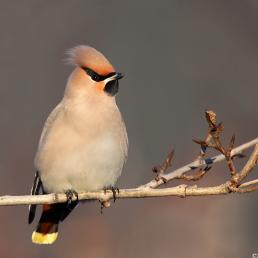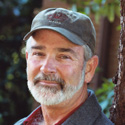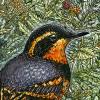

Join BirdNote tomorrow, November 30th!
Illustrator David Sibley and actor H. Jon Benjamin will face off in the bird illustration battle of the century during BirdNote's Year-end Celebration and Auction!
Scientists once believed that Australia’s songbirds — such as this Superb Lyrebird — were the result of lost birds from Asia and Africa colonizing the continent. But recent research has changed that thinking. It turns out that the Australian continent was the evolutionary epicenter of much of the world’s bird life. It appears that songbirds thrived there for 25 million years before they reached the Northern Hemisphere. It was only after the earth’s tectonic plates pushed Australia far enough north that some of its songbirds found their way to other continents.
BirdNote®
Where Birdsong Began
Written by Bob Sundstrom
This is BirdNote.
[Superb Lyrebird, http://macaulaylibrary.org/audio/8004]
For a long time, prevailing scientific wisdom had it that Australia’s songbirds were the result of lost birds from Asia and Africa colonizing the continent millions of year ago. But recent DNA and fossil research has overturned that thinking in dramatic fashion. The evidence from this work confirms that the Australian continent was the evolutionary epicenter of a huge part of the world’s bird life. Particularly songbirds, now some 4500 species strong. [Eastern Whipbird, http://macaulaylibrary.org/audio/71672]
This means that every backyard chickadee and grosbeak - [Rose-breasted Grosbeak song, http://macaulaylibrary.org/audio/113502] - had a root ancestor on the Australian continent. It appears that songbirds thrived there for 25 million years before they found their way north to other continents.
Australia’s contemporary songbirds have an eons-long head start when it comes to adaptation – and so may also have reached different levels of complexity. [Superb Lyrebird, http://macaulaylibrary.org/audio/8004]
As one Australian scientist puts it, “Australian birds are more likely to be intelligent, aggressive, loud, melodious, socially cooperative, environmentally influential, and more important for pollination than anywhere else.”
But he would say that, wouldn’t he? For BirdNote, I’m Michael Stein.
###
Bird sounds provided by The Macaulay Library of Natural Sounds at the Cornell Lab of Ornithology, Ithaca, New York.
Superb Lyrebird [8004] recorded by F N Robinson. Eastern Whipbird [71672] recorded by Scott Connop.
Rose-breasted Grosbeak [113502] recorded by Curtis A Marantz.
BirdNote’s theme music was composed and played by Nancy Rumbel and John Kessler.
Producer: John Kessler
Executive Producer: Dominic Black
© 2015 Tune In to Nature.org July 2015 Narrator: Michael Stein
ID #: australia-01-2015-07-13australia-01





